
Jacob Ludwig Felix Mendelssohn Bartholdy (February 3, 1809 - November 4, 1847) was probably the greatest child prodigy composer that music has ever seen, even compared to Mozart (an estimation made by famed author Goethe, friend of Mendelssohn's teacher Carl Friedrich Zelter). Felix was born into a well-to-do family, grandson of esteemed philosopher Moses Mendelssohn and son of banker Abraham Mendelssohn. The youngster had every advantage, not least a spectacularly advanced education from an early age. He was almost immediately a superb pianist who entertained the cream of Berlin society at cultural gatherings in the Mendelssohn house, where he sometimes had a small orchestra to test out his compositions.
By the end of his teens, he had written more genuinely great music than most composers achieve in a lifetime of striving, including his First Symphony (age 15), Octet (16), and Overture to Shakespeare's A Midsummer Night's Dream (17). Though acclaimed across Europe in his lifetime, Mendelssohn was disdained by future generations of musicians and critics for whom this Classicist, dedicated to perfection of form but little interested in advancing harmony, was far too conservative and comfortable. Yet there is considerable imagination in his best works (his Violin Concerto in E minor transformed the genre and was much-copied), and nearly everything he wrote is immediately distinctive, "Mendelssohnian" in its graceful textures, moto perpetuo adrenaline, and lack of superfluity.
He died at age 38 after several strokes (he worked far too hard, dashing all over Europe to conduct, founding the Leipzig Conservatory, overseeing ambitious concert series, etc.), but his precocious prolificness had given him a productive 22 years. There are two things I want to avoid in the following recommendations: the pretense that a single recording of a work can be recommended definitively in repertoire that has been so widely recorded, and the inclination to stick with the old-standby classic recordings.
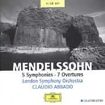 Symphonies Nos. 1; 2 "Lobgesang"; 3 "Scotch"; 4 "Italian"; 5 "Reformation"; Overture to A Midsummer Night's Dream; Hebrides Overture "Fingal's Cave"; Die schone Melusine Overture; Trumpet Overture; Overture for Wind Instruments; Ruy Blas Overture; Calm Sea and Prosperous Voyage Overture London Symphony Orchestra/Claudio Abbado (Deutsche Grammophon)
Symphonies Nos. 1; 2 "Lobgesang"; 3 "Scotch"; 4 "Italian"; 5 "Reformation"; Overture to A Midsummer Night's Dream; Hebrides Overture "Fingal's Cave"; Die schone Melusine Overture; Trumpet Overture; Overture for Wind Instruments; Ruy Blas Overture; Calm Sea and Prosperous Voyage Overture London Symphony Orchestra/Claudio Abbado (Deutsche Grammophon)
Mendelssohn's mature Symphonies are a mixed bag in form, emotional impact, and -- some say, though rather overstating it -- quality. The acknowledged masterpieces are the Third and Fourth (in order of publication, not creation), both inspired by his travels; the Second and Fifth are religious in nature, with the Second arguably the most ambitious choral symphony ever, inspired by Beethoven's Ninth but surpassing it in scope, as though an oratorio were grafted onto the first three movements of a symphony. The concert overtures are, like the Symphonies, programmatic (though a Classicist in form, Mendelssohn was a Romantic in subject matter), and the Hebrides Overture (Fingal's Cave) was, like the Third, inspired by Scotland; it's one of his finest works. Though somewhat less expressive in the overtures than some conductors due to his preference for fleet accounts, Abbado delivers vigorous readings of the Symphonies that grant them lean profiles without making them scrawny in sound. There's no question that this is the best complete set of Mendelssohns mature symphonies, and contains the best readings of Nos. 1 and 2.
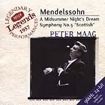 Symphony No. 3 in A minor, Op. 56 "Scotch"; selections from A Midsummer Night's Dream London Symphony Orchestra/Peter Maag (London)
Symphony No. 3 in A minor, Op. 56 "Scotch"; selections from A Midsummer Night's Dream London Symphony Orchestra/Peter Maag (London)
This has been the finest recording of the "Scotch" since the day it was made almost a half-century ago. The opening swells with pomp to just the right degree, the strings' singing tone is unsurpassed, every tempo shift is exactly right, and things move along smartly without ever seeming rushed and with all the local color observed fully without becoming sectionalized. Audiophiles need not worry that the 1960 recording date brings inferior sound -- far from it; the sonics are full and rich. Filling out this CD are 41 minutes from A Midsummer Night's Dream (1957, not quite as fine sonically but still more than acceptable), not at quite the same level of excellence but useful for collectors who don't want to spring for the whole piece. Look for the earlier (1995) but alas out-of-print edition (in Decca's series The Classic Sound) that has only the four standard instrumental selections (Overture/Scherzo/Nocturne/Wedding March) from A Midsummer Night's Dream but includes Mendelssohn's other inspiration from his trip to Scotland, the concert overture "The Hebrides" (AKA "Fingal's Cave") in one of the best and most atmospheric performances.
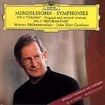 Symphonies Nos. 4 in A major, Op. 90 "Italian"; 5 in D major, Op. 107 "Reformation" Vienna Philharmonic/John Eliot Gardiner (Deutsche Grammophon)
Symphonies Nos. 4 in A major, Op. 90 "Italian"; 5 in D major, Op. 107 "Reformation" Vienna Philharmonic/John Eliot Gardiner (Deutsche Grammophon)
Usually when a little-known alternate version of a symphony appears, it's an early edition that was later changed by the composer. This CD, however, offers Mendelssohn's 1834 revision of his most popular symphony, the "Italian" (so-called because he wrote it following a stay in Venice and Rome). Oddly, his autograph of the 1833 version became the standard version. Gardiner's sprightly account of the 1833 edition does not mitigate against a nicely atmospheric performance, its dynamic and tempo contrasts aptly judged and cleanly defined. When Mendelssohn revised it, he left the first movement untouched, so Gardiner records only the last three 1834 movements. Usually Mendelssohn's revisions involved tightening up his first thoughts, but here he expands his conception somewhat in all three movements as well as making easily noticeable changes in the melodies and orchestrations. The charm of the original is not lost amid the greater complexities, and in a way, the revision's more deliberately archaic sound seems oddly more modern. The Vienna Philharmonic's luxuriant strings and Gardiner's gracefully sprung rhythms present a good case. Between the Italians comes the "Reformation" Symphony, actually an earlier work from 1830 commemorating the tercentenary of the Augsburg Confession, and prominently featuring Martin Luther's famous tune "Ein' Feste Burg ist unser Gott" ("A Mighty Fortress Is Our God") in the fourth movement. Gardiner's account lacks the pomp conductors traditionally bring to this work, though it's not that he's particularly speedy, just that he favors a light touch. Since this work is often criticized for its weighty pretensions, that actually makes it more attractive.
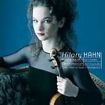 Violin Concerto in E minor, Op. 64 Hilary Hahn/Oslo Philharmonic Orchestra/Hugh Wolff (Sony Classical)
Violin Concerto in E minor, Op. 64 Hilary Hahn/Oslo Philharmonic Orchestra/Hugh Wolff (Sony Classical)
This is one of the cornerstones of the violin concerto literature and has been blessed with an impressive number of superb recorded performances over the years, ranging from the emotive Yehudi Menuhin collaboration with Wilhelm Furtwangler (EMI) to the longtime technical standard set by Jascha Heifetz with Charles Munch (RCA) to the patrician balance of Nathan Milstein (it's hard to choose between his flawless renditions with Bruno Walter, William Steinberg, and Leon Barzin; the first offers the best accompaniment, the last the best sound, and the middle a good compromise). But Hilary Hahn's 2002 recording outshines them all by combining flawless technique, a perfectly proportioned performance that never drags, golden tone, and juicily Romantic inflections. For another fascinating alternative, there's Daniel Hope's recording with the Chamber Orchestra of Europe/Thomas Hengelbrock (Deutsche Grammophon) of the original 1844 version, with Hope's performance recommended especially to listeners who favor maximum sweetness of tone and Romantic inflections.
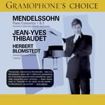 Piano Concertos Nos. 1 in G minor, Op. 25; 2 in D minor, Op. 40; Variations serieuses in D minor, Op. 54; Rondo Capriccioso, Op. 14 Jean-Yves Thibaudet/Gewandhausorchester Leipzig/Herbert Blomstedt (Decca)
Piano Concertos Nos. 1 in G minor, Op. 25; 2 in D minor, Op. 40; Variations serieuses in D minor, Op. 54; Rondo Capriccioso, Op. 14 Jean-Yves Thibaudet/Gewandhausorchester Leipzig/Herbert Blomstedt (Decca)
Mendelssohn was a piano virtuoso, and his two Concertos for Piano and Orchestra Nos. 1 in G minor, Op. 25, and 2 in D minor, Op. 40, are quite popular (especially the First, written at 21) and put the form to excellent use. For decades, there were two main choices: Rudolf Serkin's winning blend of dramatic weight, subtle wit, fleet elegance, and structural awareness (plus the refulgent accompaniment of Eugene Ormandy) in the late 1950s (now combined with Isaac Stern's heartfelt and dramatic reading of the Violin Concerto), and Murray Perahia's supremely polished and lovingly lyrical 1974 accounts (with the light-as-air accompaniment of the Academy of St. Martin-in-the-Fields under its redoubtable leader Neville Marriner), both on Columbia/Sony. But now Thibaudet's 1997 recordings combine the dramatic surge of Serkin with the tonal refinement of Perahia, in impeccable digital sound to boot. These are stormy readings of stunning contrasts and wide dynamic range, about as Romantic as you can get in these works, and the accompaniment by Mendelssohn's own orchestra is keenly attentive. Between the concertos we're given Thibaudet's scintillatingly fiery reading of Mendelssohn's greatest solo piano work, the Serious Variations, and a lovely rendition of another early gem, the Rondo Capriccioso.
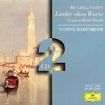 Songs without Words Daniel Barenboim (Deutsche Grammophon
Songs without Words Daniel Barenboim (Deutsche Grammophon
Generations of pianists have loved the little gems known as the Songs without Words, which display a relaxed Mendelssohn at his most elegant and charming. Over the course of the eight books of six pieces each (plus, on this two-CD set, the six Children's Pieces, Op. 72, and four other short works similar to Songs without Words), there's a wide variety of moods, from the moody, shadowed gondola songs inspired by Mendelssohn's time in Venice. In larger, more serious works, Daniel Barenboim can be an eccentric pianist, but here he too relaxes, playing warmly and with gorgeous tone while avoiding exaggerated effects in this 1973 recording of the complete set.
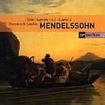 Octet, Op. 20; String Quintets Nos. 1-2; String Quartet No. 2 Hausmusik (Virgin Veritas)
Octet, Op. 20; String Quintets Nos. 1-2; String Quartet No. 2 Hausmusik (Virgin Veritas)
There is perhaps no more startling evidence of just how amazing a prodigy Mendelssohn was than his Octet, dazzling in its full but light textures and gossamer themes, utterly organic in its growth. The English group Hausmusik emphasizes those characteristics nicely on this two-CD set. (For a brawnier, more exciting, nearly orchestral interpretation, there's the Marlboro Festival gang's classic 1965 recording with Jaime Laredo, Alexander Schneider, Arnold Steinhardt, John Dalley, violins; Michael Tree, Samuel Rhodes, violas; Leslie Parnas, Davis Soyer, cellos [Sony Classical].) Aside from the Octet, Mendelssohn's chamber music is surprisingly underrated -- and under-performed and under-recorded. It also frequently refutes the hackneyed charge that Mendelssohn is all surface and no depth. The emotionally charged, four-movement String Quartet No. 2 in A minor, Op. 13 displays rich, deep-toned Beethoven-like themes and cyclical organization. The String Quintet No. 1 in A major, Op. 18 (written in 1826 and drastically revised the next decade) and the String Quintet No. 2 in B-flat major, Op. 87 (1845) are both full of lovely melodies and often bursting with the hyperkinetic energy that is so typically Mendelssohnian, yet with deeply affecting slow movements of great gravitas.
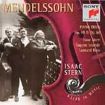 Piano Trios Nos. 1-2 Isaac Stern/Leonard Rose/Eugene Istomin (Sony Classical)
Piano Trios Nos. 1-2 Isaac Stern/Leonard Rose/Eugene Istomin (Sony Classical)
Of all the chamber music besides the Octet, the two Piano Trios may be the most typically Mendelssohnian. Refulgent melodies that show off the violin and cello to best advantage, gorgeously ruminative Andante movements, and Scherzos with his trademark combination of fleetness and lightness combine to make these dazzling and ingratiating works. The string players are definitely the focus in these classic recordings from 1966 and 1979, with Stern and Rose giving these works a heftier, more Romantic profile than more recent performers. For more lithe and light readings, with a better pianist (Benjamin Frith) balanced more equally, there's a wonderful budget recording by the Gould Piano Trio (Naxos).
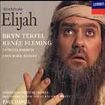 Elijah Bryn Terfel, Renee Fleming, etc./Edinburgh Festival Chorus/Orchestra of the Age of Enlightenment/Paul Daniel (Decca)
Elijah Bryn Terfel, Renee Fleming, etc./Edinburgh Festival Chorus/Orchestra of the Age of Enlightenment/Paul Daniel (Decca)
Some of Mendelssohn's audiences, particularly in England, admired him most for his oratorios, which look back to Handel and Bach yet are quite of their time harmonically. Elijah, by far the more effective in comparison to the also-popular Saint Paul, is best put across by a dramatic reading of the title role, and certainly Bryn Terfel's larger-than-life depiction of the Old Testament prophet is vivid and compelling. This extended work can drag, but Paul Daniel, at the head of an impressive period-instruments band and a clear, well-disciplined choir, presents the work with apt vigor.
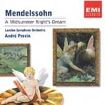 A Midsummer Night's Dream Lillian Watson, Delia Wallis/Finchley Children's Music Group/London Symphony Orchestra/Andre Previn (EMI Classics)
A Midsummer Night's Dream Lillian Watson, Delia Wallis/Finchley Children's Music Group/London Symphony Orchestra/Andre Previn (EMI Classics)
Another example of Mendelssohn's precocity: at age 17, inspired by Shakespeare, he wrote his concert overture A Midsummer Night's Dream. He expanded it 17 years later into a much bigger work that could accompany the play. The elegant lightness of his style has often been compared to fairies, and it finds a perfect subject here -- though he also simply but perfectly depicts donkey braying. The dazzling Scherzo and much-used Wedding March are now even more famous than the Overture. Excerpts of these three sections and a few more are common; this CD contains the complete incidental music, with vocal texts in English but minus the narration (which has never received a reading on record that encourages repeated listening). The LSO achieves an apt theater-orchestra tone in this 1977 recording, now at budget price.
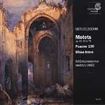 Motets RIAS Chamber Choir/Marcus Creed (Harmonia Mundi)
Motets RIAS Chamber Choir/Marcus Creed (Harmonia Mundi)
With Psalm 100; Psalms, Op. 78 Nos. 1-3; Motets, Op. 69 Nos. 1-3; Chorale Motet, Op. 23 No. 3; Missa breve; and "Zum Abendsegen," this is an excellent cross-section of Mendelssohn's a capella choral writing. This music at times suggests Bach using early Romantic harmonies, but unlike most of his contemporaries, Mendelssohn handles contrapuntal complexity adroitly. The three mercurial Op. 78 settings, dating from the last year of his life, exhibit variety: women's and men's voices alternating, chordal and contrapuntal writing, choral and solo or one-on-a-part textures, and of course dynamics and tempos. These pieces and the Op. 69 settings (the German texts of familiar English canticles) rank among the finest Romantic choral compositions. The 37-voice RIAS Chamber Choir's creamy blend and phrasing presents the best case for them, and Creed inflects them with apt yet not overdone Romantic fervor and flexibility.
